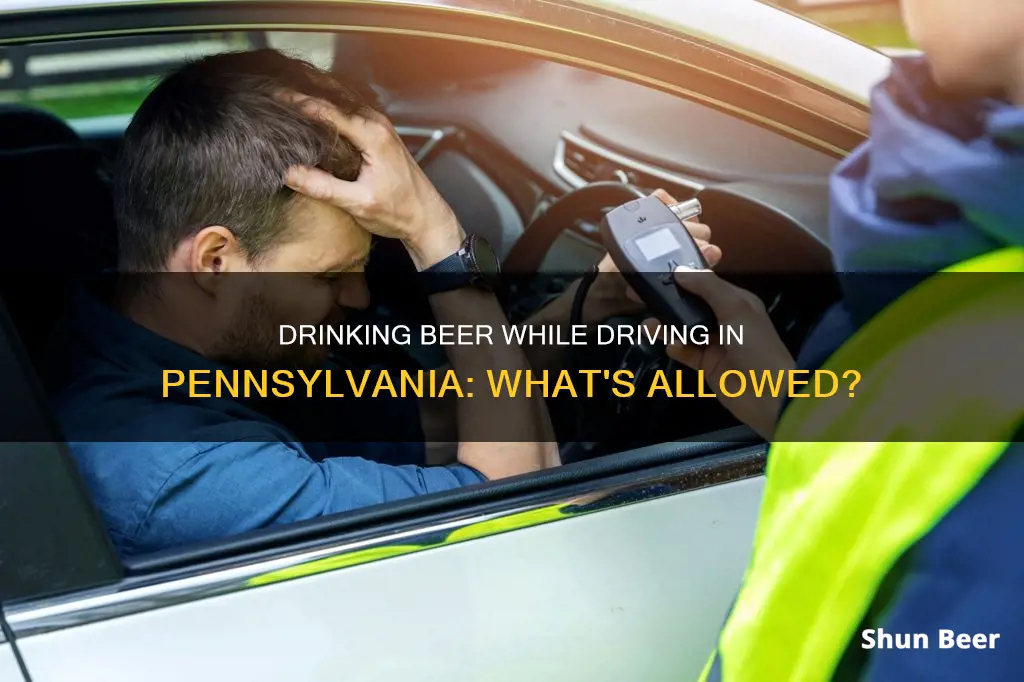
Drinking and driving is illegal in most places, but what about drinking as a passenger? In Pennsylvania, open container laws apply to both the driver and passengers of a vehicle, meaning that neither can possess an open alcoholic beverage while on the road. These laws are in place to prevent drinking and driving, but what constitutes an open container? And are there any exceptions to these laws?
| Characteristics | Values |
|---|---|
| Who does the law apply to? | Drivers and passengers |
| What is prohibited? | Possessing an open alcoholic beverage container, consuming a controlled substance, or drinking alcohol |
| What is considered an "open container"? | Any bottle, can, or receptacle that contains any amount of alcoholic beverage and is open, has a broken seal, or has had its contents partially removed |
| Are there any exceptions? | Yes, passengers in limousines, buses, taxis, house coaches, RVs, and trailers may drink alcohol under certain conditions |
| What are the penalties for violating the law? | A summary offense, a fine of up to $300, up to 90 days in jail, license suspension, and increased auto insurance |
What You'll Learn

Open container laws in Pennsylvania
In the state of Pennsylvania, open container laws apply to both drivers and passengers of motor vehicles. This means that neither a driver nor a passenger can have an open alcoholic beverage in a vehicle. The law is codified at 75 Pa.C.S.A. § 3809.
The actual consumption of alcohol is not a decisive factor when police attempt to determine whether the open container law has been violated. Even if a person charged under this law is legally entitled to use alcohol, it is not a valid defence. To defend against an open container charge, one must prove that they did not possess an open alcoholic beverage or that they did not violate the law.
Pennsylvania's open container law defines an 'open alcoholic beverage container' as any bottle, can, or other receptacle that contains any amount of alcoholic beverage and is open, has a broken seal, or has had its contents partially removed. The law applies to the passenger areas of a vehicle, where the driver or passengers have access. However, transporting an open container in the trunk of a vehicle is generally allowed.
There are some exceptions to the open container law in Pennsylvania. Passengers in buses, taxis, and limousines are allowed to drink alcohol or possess open containers if the passenger area is used mainly for transporting individuals for compensation. Additionally, passengers in the living quarters of a house coach or house trailer are permitted to consume alcohol or possess open containers.
Violating Pennsylvania's open container law is a summary offence, punishable by a fine of up to $300 and/or up to 90 days in jail. The penalties can also include license suspension and increased auto insurance costs or loss of coverage.
Beer and Diverticulitis: What's Safe to Drink?
You may want to see also

Police powers and probable cause
In the state of Pennsylvania, police officers are permitted to make an arrest if they suspect a driver is under the influence of alcohol. However, they don't always need probable cause to initiate a vehicle stop. Probable cause is a higher form of reasonable suspicion, and in the context of car stops, it usually involves a police officer observing a violation of the vehicle code, such as speeding.
A warrantless seizure, or vehicle stop, is generally considered "presumptively unreasonable" under the Fourth Amendment. However, there are exceptions to the search warrant requirement. Police officers are allowed to briefly detain an individual for investigation and, if appropriate, conduct a frisk for weapons or contraband if there is a reasonable suspicion of criminal activity.
In the case of Pennsylvania v. Gary, it was established that police can search a car if they have probable cause to believe a crime is occurring, such as the presence of drugs or other contraband. The Supreme Court of North Carolina has also drawn a distinction between Reasonable Suspicion to stop and Probable Cause to stop, with the former being a lower standard that requires a careful analysis of the factual scenario.
For a vehicle stop to be constitutional, the police officer must articulate a clear investigative purpose. For example, if a car is stopped for briefly crossing a lane line, the officer must explain that they believed the driver was intoxicated or in some other form of distress. This is because a single lane line cross without causing an accident or the threat of one is usually not a sufficient reason for a police officer to stop a car.
If a police officer fails to articulate these reasons, a court could find the stop unconstitutional, violating both the state and US Constitution. Evidence obtained illegally, without probable cause or reasonable suspicion, cannot be used to prosecute an offender.
In summary, while police officers in Pennsylvania have the power to make arrests and initiate vehicle stops based on probable cause or reasonable suspicion, they must follow specific guidelines to ensure the protection of citizens' rights.
Antibiotics and Non-Alcoholic Beer: What You Need to Know
You may want to see also

Defending against an open container charge
In Pennsylvania, it is illegal to possess an open alcoholic beverage container while on the roads, regardless of whether you are the driver or a passenger in the vehicle. An 'open alcoholic beverage container' is defined as any bottle, can, or other receptacle that contains any amount of alcoholic beverage and is open, has a broken seal, or has had its contents partially removed.
However, there are a few exceptions to this rule. The open container law does not apply to passengers in vehicles such as limousines, buses, and taxis, where the passenger area is used mainly for transporting individuals for compensation. Additionally, open containers are permitted in the living quarters of house coaches, RVs, and trailers, as long as the driver does not have access to them.
If you are facing an open container charge in Pennsylvania, here are some possible defences to consider:
- Prove that you did not possess an open alcoholic beverage container: To defend against an open container charge, you must prove that you did not possess an open alcoholic beverage or that you did not violate the law.
- Permissible vehicles: If you were in a vehicle where open containers are permissible, such as a bus or limousine, the charge may be dismissed.
- Lack of knowledge and control: If you were a passenger in a vehicle with an open container but you were unaware of its presence and did not exercise control over it, you may have a defence. However, Pennsylvania does not have constructive possession presumptions, which may make this defence challenging without the assistance of a skilled criminal defence attorney.
- Challenge the evidence: When a police officer makes a charge, the prosecution must preserve both physical and documentary evidence correctly. If the chain of custody of the evidence was broken or the police failed to follow proper protocols, the court may be required to drop the charges.
- Assert a violation of your constitutional rights: Depending on the specific facts and circumstances of your case, you may be able to assert that your constitutional rights were violated during the search and seizure process.
It is important to note that simply being legally allowed to consume alcohol is not a valid defence against an open container charge. Additionally, an arrest does not automatically imply guilt, and you have the right to defend yourself against these charges. Consulting a knowledgeable Pennsylvania open container attorney can help you navigate the legal process and raise all possible defences.
Booster and Beer: Is It Safe to Drink Alcohol?
You may want to see also

Exceptions to the open container law
Drinking beer while driving is illegal in Pennsylvania. The state's open container laws apply to both drivers and passengers of motor vehicles, and neither can possess an open alcoholic beverage container while on the roads. However, there are some exceptions to this rule.
Pennsylvania's open container law has some exceptions for certain types of vehicles. Here are the instances where passengers are allowed to possess or consume an open container of alcohol:
- Passengers in limousines, buses, and taxis: A passenger can lawfully consume or possess an open container of alcohol in the passenger area of a vehicle used mainly for transporting people for compensation, such as limousines, buses, and taxis.
- Passengers in RVs and trailers: The open container law does not prohibit the consumption or possession of open containers of alcohol in the living quarters of a house coach, RV, or trailer.
- Open containers in the trunk or non-passenger areas of a vehicle: The law applies only to the passenger areas of a vehicle, which the driver or passengers can access. Therefore, transporting an open container in the trunk or a secured, locked container in the back of the vehicle is generally allowed.
Beer and Keto: What You Need to Know
You may want to see also

Penalties for open container violations
In Pennsylvania, drinking beer or possessing an open container of alcohol while driving is prohibited. The state's open container law, codified at 75 Pa.C.S.A. § 3809, applies to both drivers and passengers in motor vehicles. The law states that neither a driver nor a passenger can possess or consume an open alcoholic beverage in a vehicle. This means that even if the driver is sober, the presence of an open container in the vehicle is still a violation.
Now, let's discuss the penalties for open container violations in Pennsylvania in detail:
Violating Pennsylvania's open container law is considered a summary offense. This type of offense carries penalties that may include monetary fines and/or jail time. Specifically, a person found in violation may be fined up to $300, and in some cases, they may face up to 90 days in jail. These penalties can be enhanced depending on the surrounding circumstances and the individual's prior criminal history.
It is important to note that the actual consumption of alcohol is not a decisive factor in determining a violation. Even if the open container is not being actively consumed, simply having it in the vehicle can result in charges being filed. Additionally, the open container law applies regardless of whether the vehicle is moving or parked.
Exceptions to the Open Container Law:
While the open container law in Pennsylvania is strict, there are some exceptions. Passengers in certain types of vehicles are exempt from the law:
- Buses, Taxis, and Limousines: Passengers in these vehicles are allowed to consume or possess open containers of alcohol in the passenger area, as long as it is primarily used for transporting people for compensation.
- RVs, House Coaches, and Trailers: The open container law does not apply to the living quarters of these vehicles, so passengers may consume or possess open containers in those areas, away from the driver's access.
Defending Against an Open Container Charge:
It is possible to defend against an open container charge with the help of an experienced criminal defense attorney. If you were a passenger in a vehicle where open containers were present but you were unaware and had no control over that area, you may have a valid defense. Additionally, if the open container was in a permissible vehicle, such as a bus or limousine, a charge may be dismissed.
Impact on Insurance and Criminal Record:
While the criminal penalties for open container violations may not seem severe, a conviction can have broader consequences. It can result in a criminal record, increased auto insurance rates, or even an insurance company dropping its coverage. These collateral consequences can significantly impact an individual's life.
In summary, Pennsylvania's open container law is strictly enforced, and violations can result in fines, jail time, and other collateral consequences. It is essential to understand and comply with the state's laws regarding the consumption and possession of alcohol in motor vehicles to avoid legal penalties and protect your rights.
Topsy Beer: Brewing Process and Science Explained
You may want to see also
Frequently asked questions
No, you cannot drink a beer or any alcoholic beverage while driving in Pennsylvania.
No, you cannot be in possession of an open alcoholic beverage container while driving in Pennsylvania. This applies to both drivers and passengers.
An "open container" is any bottle, can, or receptacle that contains any amount of alcoholic beverage and is open, has a broken seal, or has had some of its contents removed.
Violating Pennsylvania's open container law is a summary offense, punishable by a fine of up to $300 and/or up to 90 days in jail.
Yes, there are some exceptions. Passengers are allowed to drink alcohol in certain types of vehicles, including limousines, buses, taxis, RVs, and trailers. However, the alcohol must be consumed or stored in the back of the vehicle or in living quarters where the driver does not have access.







